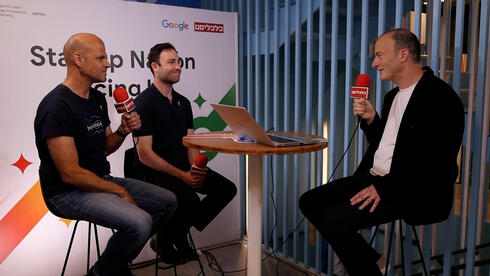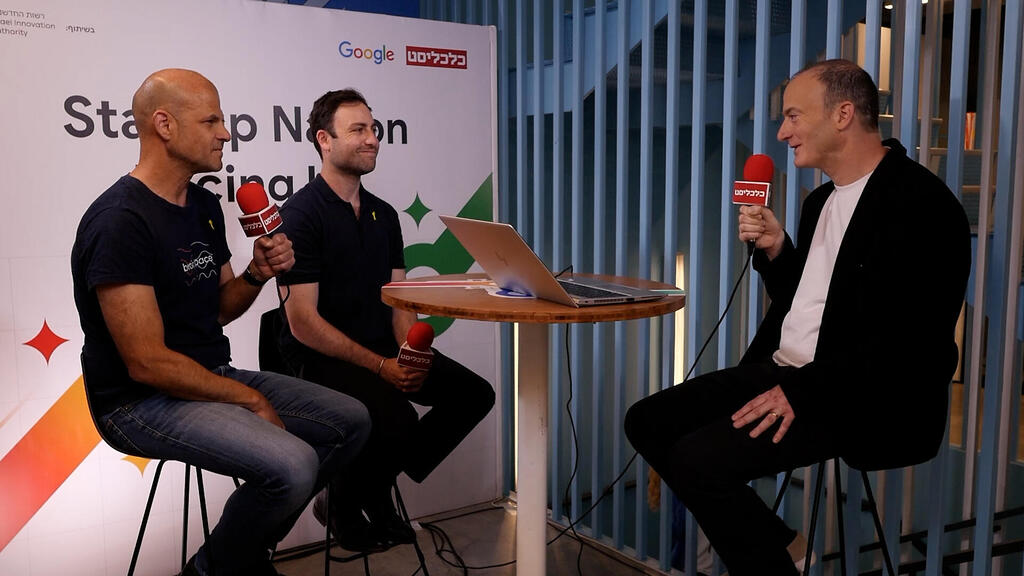
"Running a startup is like going to war—you need teammates who don’t give up when things get hard"
Ilay Marom, co-founder and COO of the startup NaNose Medical, was speaking on a panel held at Google and Calcalist’s Startup Week. Yair Levy, Brain.space: "I think Israel—its people and its tech ecosystem—has proven its resilience and creativity."
“Running a startup is like going to war—you need teammates who can adapt, who don’t give up when things get hard,” said Ilay Marom, co-founder and COO of the startup NaNose Medical, during a panel at Google and Calcalist’s Startup Week. The discussion addressed a particularly timely question in the aftermath of October 7: How can startups grow during times of uncertainty? Marom was joined by Yair Levy, co-founder and CEO of Brain.space.
1 View gallery


Yair Levy of Brain.space (left) and Ilay Marom of NaNose Medical (center) interviewed by Calcalist
(Sinai David)
Can you briefly tell us what your startup does and what problem it solves?
Ilay Marom, NaNose Medical:
“We’ve developed a groundbreaking, life-saving sensing technology for the early diagnosis of diseases using biomarkers—biological substances that indicate health conditions—found in exhaled breath. We’re currently backed by grants from the European Union, the Israel Innovation Authority, and Google. We’re collecting data in ten hospitals, with promising results—both for staging fatty liver disease and for diagnosing lung cancer.”
Yair Levy, Brain.space:
“We’re a deep-tech company working with neurophysiological data—signals collected from the brain and body. Using a proprietary platform we developed, we quantify users’ mental and cognitive states. Our models allow us to understand how various products, services, or medications affect those states.”
Where were each of you on October 7, and what was your company’s status at the time?
Marom:
“Technologically, we were at a breakthrough moment. But like many startups that raised money in 2021, we were mid-roadshow trying to secure additional funding. I was in Germany, our CEO was in Japan, and the war caught us both while abroad. It was an incredibly difficult moment.”
Levy:
“On October 6, we were about to sign a term sheet with a major American fund. Then we woke up to a new reality. Everything froze. I told our employees: ‘First and foremost, take care of your families. Stay home and stay safe.’ After three days, a few of us—just four—returned to the office. I messaged the team that while their safety and families came first, the office was open. The next day, 90% of the team showed up. Everyone gave 150%.”
You managed to stabilize financially thanks to grants. But how did you handle operations after October 7?
Marom:
“We’re deeply grateful to both the Innovation Authority and Google. We had been negotiating term sheets with two European funds, but on October 8, I received an email I’ll never forget: due to a shift in geographic strategy, they were pulling out. That left us in a state of profound uncertainty. The Innovation Authority grant, along with Google’s matching support, helped get us back on our feet.
“Meanwhile, I and our Head of AI Software, Gilad, were both called up for reserve duty. We thought our entire timeline would be delayed. But what surprised us—and I don’t think it’s unique to us—is how the team stepped up. The employees who came in gave 150%, even 200%. We ended up advancing the development timeline beyond what we had planned before the war.”
Levy:
“As Ilay said, around 20% of our team—including some of our managers—were called up. But what stood out was how willingly and naturally the rest of the team stepped in to cover for them. People learned new roles. Ops team members helped with development and assembly. Developers went to international conferences to demo our systems. What we saw was a team with extraordinary resilience and adaptability.”
This is a panel on growth during instability. How did the October 7 crisis actually help your companies, and do you have advice for Israeli entrepreneurs today?
Marom:
“The biggest lesson is that everyone had to operate differently. We saw employees go above and beyond, taking on tasks outside their usual roles and working overtime. My top advice to entrepreneurs is: choose the right people. Running a startup is like going to war—you need teammates who can adapt, who don’t give up when things get hard. Watching our team rise to the occasion was truly inspiring.”
Levy:
“There are three key lessons we learned from the war. First, everyone needs an anchor—and that anchor is home. Second, you must stay focused on your goals. Know what not to do, as much as what to pursue. And third, versatility. It’s part of the Israeli DNA—the ability to pivot between missions, cover for a teammate at the front, and keep things running. My team embodied that, and that’s why we’re still standing strong.”
Are you optimistic about the future?
Marom:
“We’re still living through a difficult period, and I want to start by saying I hope the hostages return home soon and that this war ends quickly. That’s what matters most. From a business perspective, it’s a very tough time for startups. I don’t yet see doors reopening for Israeli companies abroad. It will take time. I truly hope it happens soon.”
Levy:
“As a startup founder, I have to be a bit more optimistic. I think Israel—its people and its tech ecosystem—has proven its resilience and creativity. Yes, some investors will walk away. But what I’ve learned is that we need to be more selective in choosing our partners. That strategy worked for us. I’m deeply optimistic about our ability, as Israelis, to strike the right balance: supporting each other at home, keeping our hearts with our soldiers at the front, and still staying locked in on our mission. That’s how we’ll succeed.”













